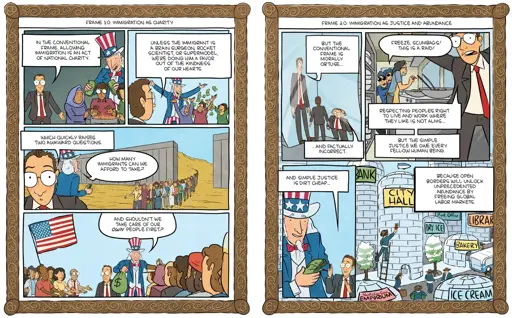By David Swanson, World BEYOND War, September 8, 2025
There’s a book called “Open Borders” on the shelves of mainstream corporate bookstores. This is very good news, but it may be because the book is a comic book (fun!) and/or because the book is about economics, very scientistic, and “Libertarian” (none of that caring about people crap!).
Abolition movements will require all types when the institution that needs abolishing is massive and entrenched. World BEYOND War is putting together a conference looking at a variety of abolition movements. We certainly must welcome into the antiwar movement those who oppose war because it costs money. War, in fact, has, in the past century, killed more people by diverting resources away from useful spending than through the violence of war. Of course it’s tricky, because those who oppose spending money on anything also oppose spending it on useful things. Still, it requires all types if you want to take on wealth and power.
The libertarian argument for open borders is very much, in a certain sense, about caring about people — specifically caring about every individual’s ability to move wherever on the planet he or she wants. (Any societies that perish or cities that are depopulated can go suck it.) The book by Bryan Caplan, with artwork by Zach Weinwersmith, also debunks lots of Trumpian demonization and fearmongering, explaining that immigrants do not tend to be criminal or destructive, etc. This is all to the good!
But, there are some big omissions in Open Borders: The Science and Ethics of Immigration. On page 7 the authors suggest that billions of people would immigrate if they could. On page 8 they offer as evidence a poll claiming that more than 100 million people worldwide dream of life in the United States, which the authors call, on the very same page, “hundreds of millions.” If you look up the poll, it says “About 13% of the world’s adults — or about 630 million people — say they would like to leave their country and move somewhere else permanently. For roughly 138 million people, that somewhere else would be the U.S.”
I think that’s significant, but still wonder about the other 87% who are quickly written out of the story. You can’t get a percentage as small as 13% in the United States in almost any poll, no matter how whacky (belief in ghosts, angels, etc.) In a corner of page 16, the authors dismiss without argument the idea of making life better for people where they are. And nowhere do they so much as mention the possibility of compelling the U.S. government to cease making life worse for people where they are. If the U.S. government were not sanctioning, indebting, occupying, or bombing anywhere, nor providing any nations with prisons or the training of torturers, nor arming any militaries, what would the polls tell us? The authors are at pains later in the book to come up with other reasons why open borders would not result in huge numbers of migrants on day 1. The case for that could be much stronger than they think.
The authors are also at pains to explain how immigrants pay for themselves and enrich others, but never mention the major savings to be found in demilitarizing borders — not to mention the long-term demilitarizing effects of weakening nationalisms. Presumably this is because of their stated support for the Department of War (which they claim actually defends people, probably based largely on its old name).
The claim that immigrants pay for themselves is interesting, and has some strong points. It leans heavily on the idea that most immigrants are working-age people, which might not remain the case. And it’s a little bit disgusting. Must we assume that readers cannot recognize the need for fairness and kindness even for people who do not economically benefit the readers?
Then there’s the complete absence from the book of the cratering ecosystems of the Earth. Can the planet handle the travel? Can it handle turning hundreds of millions of people with low environmental impact into U.S.-level Earth-destroyers? Can any of this be done in combination with the greening of our ways of life — either through government initiative, magic, or otherwise? Does life on Earth stand a better chance of survival if we do more to improve life in poor countries or more to bring people into rich countries or some combination? The topic is never raised.
Then there’s the vision of the world after the opening of the borders. The authors envision deregulation and depict immigrants to the United States as voters, never as union organizers or leaders of nonviolent activist campaigns as they are known in much of the world. There’s no discussion of the opening of borders being accompanied by the raising of environmental standards or workers’ rights to the highest level. The lowest level, spread globally, would be disastrous. And the notion that poor countries can simply be forgotten once you’ve allowed people to leave them is bizarre.
Ray Acheson’s Abolishing State Violence: A World Beyond Bombs, Borders, and Cages, envisions the abolition of borders accompanied by the expansion of human rights. The Case For Open Borders by John Washington gives us a perspective on the damage done by borders and their militarization. The more open borders books from the more angles, the better!
The post OPEN BORDERS But Do It Right appeared first on World BEYOND War.
From World BEYOND War via this RSS feed



